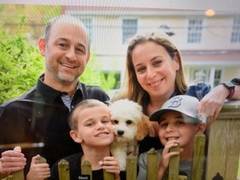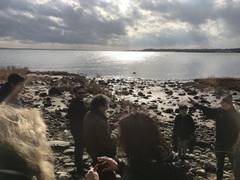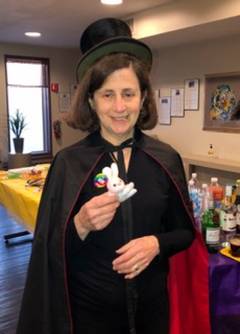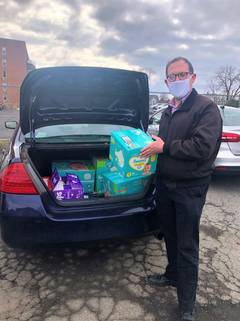Rosh Hashanah 5783 Day 2: The Power of Kindness
10/06/2022 11:51:10 AM
Rabbi Ben Goldberg
| Author | |
| Date Added | |
| Automatically create summary | |
| Summary |
Some years ago, I met an extraordinary woman who taught me the power of kindness.
I spent a summer working as a hospital chaplain, where I was assigned to the Intensive Care Unit. My job was at once straightforward and extraordinarily complex: I was to visit patients and their families, offering them spiritual support during their time of crisis. Mostly, I did a lot of listening, as patients and their families told me what was on their minds and in their hearts.
One day, I walked in to the room of a patient I’ll call Lilly. Lilly was an older woman in the ICU. She had a mask on that helped her to breathe. I did my best to understand her, as she spoke through the tubes and the machines. I held her hand and spoke reassuringly to her.
This continued for days, and then weeks. I would check in on Lilly on my rounds through the ICU. Sometimes I would pray with her, or get the nurse, or help Lilly in some small way. I would spend 15 or 20 minutes every day with Lilly, doing my best to listen to her, lingering with her, not running off to the next patient like the rest of the hospital staff.
It was clear to me that Lilly suffered tremendously during this time. Every breath was a struggle. But through the labored breathing and beeping machines, I could hear that there was a person in there. A person who loved her family and had lived a fulfilling life. A person whose greatest wish was simply to go outside and breathe some fresh air.
Once, on one of her good days, I came in and Lilly was sitting in the chair, with her son beside her. She was happy to see me. “This man,” she told her son, “is so kind.”
I was stunned. Me? I had just spent a little time with her, doing what anyone would do in my role. Me? The guy who forgets to call his mother? Kind?
Lilly taught me that day about the power of kindness. For me, our interactions were all in a day’s work. But for Lilly, our time together was a light in the darkness. A little care, a little attention, a little validation—that’s all it took for Lilly to know that her life now, in the hospital, retained something of its vitality and value.
I tell this story, today, on Rosh Hashannah, because today is the day when we try to re-set our relationships with God and each other. These hours in prayer are meant to spur us to change our ways in the world, to become the best versions of ourselves, the people that God wants us to be.
So, who does God want us to be? The Talmud (Sota 14a) asks, “What is the meaning of the verse in Deuteronomy ‘After the Lord, your God, shall you walk?’” This verse is somewhat puzzling: how could a human being walk after God? Even if God had some kind of physical manifestation we could follow behind, we read elsewhere in Deuteronomy that God is a “consuming fire” (Deut. 4:24), such that we would die if we got too close to it.
So, the Talmud answers: that verse means that we are to follow the character traits, the midot, of God. There is something about how God acts in the world that we are supposed to imitate as best we can. We might expect those character traits to be something so totally Divine that we could never achieve it ourselves: just as God is perfect, so too shall you be perfect. Just as God is all-knowing, so too shall you be all-knowing.
So listen, then, to how the Talmud answers: “As God clothes the naked' so you, too clothe the naked. The Blessed Holy One visited the sick, so you, too, visit the sick. The Blessed Holy One comforted mourners,' so you, too, comfort mourners. The Blessed Holy One buried the dead; so you, too, bury the dead."”
You want to achieve spiritual perfection? You want to be like God? This text says: don’t sit and meditate all day. Don’t speculate about the nature of the cosmos. Don’t retreat from society for the proverbial mountaintop.
Rather: reach out to someone who is in need. Find someone in her moment of greatest vulnerability, of loss, of illness, of humiliation. And then– do something about it! Give them material support, or a moment of your time, or a comforting word, or a dignified burial.
This is not about getting recognition from the people we help. After all, some of the people we are called upon to help are dead. So this can’t be about, “I’ll scratch your back and you’ll scratch mine.” This is not about feeling good about ourselves. This is about being God’s emissary in the world. This is about being kind, because that’s how God wants us to be.
But acts of kindness are not only about us imitating God. Our tradition teaches that human kindness can even impact God. This morning, we read a passage from the prophet Jeremiah that promises the jubilant return of the people Israel from exile. Jeremiah invokes the Matriarch Rachel to express the grief experienced by the exiles. Jeremiah depicts Rachel weeping inconsolably for her exiled children.
But then, God reassures Rachel that her tears will be short-lived: “Thus said the LORD: Restrain your voice from weeping, Your eyes from shedding tears; For there is a reward for your labor … They shall return from the enemy’s land.” (v. 16). Rachel’s sorrow will be replaced by joy; her children’s exile with homecoming.
“There is reward for your labor,” God tells Rachel. So what exactly did Rachel do? The medieval commentator Rashi offers a stunning explanation. He recounts a story that takes place in the days of the evil Israelite King Manasseh, who notoriously placed an idol in the Temple. God was so incensed that he sought to destroy the people for their disloyalty. All of the Patriarchs and Matriarchs gathered in heaven to try to intercede with God, but none succeeded. Finally, Rachel stepped up and audaciously asked God: Who is more merciful? You, or a flesh-and-blood person like me? The answer is obvious: God’s mercy is greater than any person’s.
Rachel then says to God: “Look. See these disloyal people here? I once was supposed to marry their great-great-great-grandfather Jacob. And at the last minute I got switched out for my ugly older sister whom no one wanted to marry. Now, if I could find it in myself not to be jealous of her, then surely You, God, can overcome your jealousy of this idol.” And after Abraham, Isaac and Jacob all failed, Rachel succeeded in moving God, from a place of anger to a place of compassion and kindness.
That was Rachel’s labor. Through her kindness, even in a situation where anger was warranted, Rachel convinced God to spare the Jewish people, despite their disloyalty. As Rabbi Shai Held explains, “[Rachel’s] singular display of humanity is what enables her to move heaven. So great is compassion…that it has the power to break God’s heart open.”
As we are gathered here on Rosh Hashannah, we too hope to break open God’s heart. A midrash (Leviticus Rabbah 29:3) teaches that God begins Rosh Hashannah enthroned on the seat of strict judgment, prepared to mete out the punishments we deserve. But then, we here on earth blow the shofar, which prompts God to move to the throne of compassion.
But blowing the shofar is not magic. All by itself, it won’t ensure that our futures will be better than our pasts. Its blasts must be accompanied by a recommitment to the kindness exemplified by Rachel. Otherwise, Rosh Hashannah becomes an empty ritual.
Now, I know what you are thinking. “This is all very nice, Rabbi, but come on. People have been telling me to be kind since I was in kindergarten.” And you’re right. So, let’s complicate this a little.
Being kind is actually really difficult! Our tradition wouldn’t describe it as the peak of spirituality if it were easy to do. Too often in our world kindness is the exception, not the rule. And I certainly implicate myself as well in this: I know I need to work on kindness just like anyone else. So I want to think about what stands in the way of acting like we all know we should, even though we often don’t.
First, being kind takes time and attention, things that these days are often in short supply. In our rush to finish our day’s work, it’s easy to overlook the person in need of a smile or a friendly word or material assistance. Immersed as we are in our own problems, both profound and trivial, it’s easy to forget that there are other people around us who are suffering. And as more human interaction takes place on so-called “social” media, it’s easy to forget that there’s a real person on the other end, a person with feelings and problems not dissimilar to our own.
Second, the last two plus years of health crisis and social and economic upheaval have also made it harder to be kind. Let’s face it: we’ve all been through a lot (although some more than others) and kindness becomes more difficult to demonstrate when we ourselves are struggling. Everything from the direct health impacts of COVID, to the supply chain and inflation issues connected with it, to the prolonged isolation where our social graces may have gotten a bit rusty, so-called Great Resignation that left jobs vacant or filled with less experienced people, has stressed institutions of all kinds, from local neighborhood restaurants to large corporations and organizations. As the comedian Aziz Ansari put it, everything nowadays is just a little bit worse–he used a more colorful word–than it used to be.
I’ve seen the impacts of this everywhere. On a recent vacation, I saw a sign in a hotel lobby gently reminding guests that the staff were doing the best they can with the available supplies and workers, and to be kind and courteous to them. Or, another sign I saw in a hospital that firmly told patients and family members that abuse and harassment of the staff, who have worked through nightmarish and life-threatening conditions over the last two and a half years, would not be tolerated. Perhaps you’ve seen similar signs, or even witnessed aggressively unkind behavior in customer service settings over the last year. This is all an indication that even basic politeness and courtesy have become, for good reason, more difficult in recent years.
Political and ideological differences are a third obstacle to kindness. It’s easy to get so wrapped up in the rightness of our side that we mock and dehumanize our opponents. We express disbelief that any thinking person could even consider voting for her or him or supporting this or that policy. We shout and call names, without taking the time to understand where our opponents are coming from, what legitimate concerns they might have. Bothering to listen empathetically across ideological divides is threatening: we might discover a new perspective or consideration that challenges what we thought we knew.
Now, you may be thinking: it’s the other side that does that! My side is the one that’s opened-minded and thoughtful! That kind of defensiveness might work on CNN or Fox News. But it doesn’t work today. Not on Rosh Hashanah. Not on this day of introspection and judging what is really true and what is not. This day requires that we honestly assess how we balance our convictions with our empathy. Getting that right will enable us to act with more kindness, especially towards people we too easily turn into caricatures.
Finally, fear presents an emotional obstacle to acting kindly. Think back to that list of God’s behaviors we are meant to emulate: clothing the naked, visiting the sick, comforting mourners, burying the dead. They each require us to confront our own vulnerability, our own mortality.
This person who is sick with a terminal illness—could that happen to me? Or even worse, to someone I love? That person whose life was shattered by loss—am I next? The person who left behind no one to bury her—will I die alone?
Our instinct is to run away from these situations, precisely because they trigger these fears within us. These fears are real and deep. I felt them in my early days as a chaplain, when I had trouble just getting in the door. So our spiritual task, then, is to overcome these fears. Through experience—biting the bullet and just doing it—we can get more comfortable with our discomfort, even as it never fully goes away.
Now, I’ll be the first to admit that overcoming the four obstacles I mentioned and others is not easy. But it’s not meant to be easy; it’s the spiritual task of a lifetime. The High Holidays provide an annual check-up on how we are progressing. We gather year after year to review what we have written in the book of our lives, hoping that we will be blessed with another year to try to be a little bit better.
We don’t need to make the type of grand self-sacrifice our ancestor Rachel did. Lots of small ones will do. So smile at a stranger. Give a lonely person you know a call. Don’t text; call. Even better, visit, if you can. Give someone the gift of kind human presence. I mean it: in a moment I’m going to pause, and I want you each to decide right now: Who am I going to call after Rosh Hashanah? Who in my life could use some kindness?
[Pause.] You got one? Good.
Do you remember Lilly, my patient? On my last day at the hospital, I found out when I arrived that Lilly had died just an hour before.
Apparently, she waited for her son to get there. He told her that she could let go, after bravely holding on through weeks of terrible suffering. Her heart stopped minutes later. But she had given her son a final kindness: the ability to say goodbye.
It was not how I expected to spend my last day at the hospital. I was struck by Lily’s ability to manifest kindness to her son even under the most difficult circumstances. If Lilly lived anything like the way she died, she must have lived a life of extraordinary kindness, a kindness she knew so well that she was able to recognize it in me.
May Lilly’s memory be a blessing, and may it inspire us to make this new year, a year of kindness.
Tue, November 18 2025
27 Cheshvan 5786
Photo Gallery
Photo Albums
|
(7 Albums) 1
|
-

Paws With Your Pet!
Our KTI extended family & their furry friends....
(14 photos) -

Trees, Torah & Tu Bishvat Hike
(12 photos) -

Megillah Reading - Happy Purim!
(10 photos) -

Casino Night Fun!
Saturday evening, February 1, 2020
(28 photos) -

Social Action in Action!
(3 photos) -

Gala 137 - A Night November to Remember
(43 photos) -

KTI Gala 137 Journal
(44 photos)
|
(7 Albums) 1
|
Upcoming Events
-
Tuesday ,
NovNovember 18 , 2025Women's Rosh Chodesh Group
Tuesday, Nov 18th 12:00p to 1:30p
New Women's Rosh Chodesh Group Tuesdays, 12:00-1:30pm Gather with Cantor Sklar and KTI friends at the start of each month of the Hebrew calendar to learn about the themes and traditions of the coming month. Learn from each other, learn more about each other and better understand the women within our tradition. Enjoy music and lunch together! Please a dairy or parve lunch to enjoy at noon, followed by the discussion at 12:30pm. KTI will provide drinks and dessert. RSVP Appreciated -
Wednesday ,
NovNovember 19 , 2025Rabbi, May I? Modern Responsa
Wednesday, Nov 19th 10:00a to 11:30a
Wednesdays, 10 - 11:30 AM, KTI Library Ever since Abraham’s famous argument with God, Judaism has been full of debate. Moses and Korah, David and Nathan, Hillel and Shammai, the Vilna Gaon and the Ba’al Shem Tov, Spinoza and the Amsterdam Rabbis . . . the list goes on. No wonder that Judaism cherishes the expression machloket l’shem shamayim, “an argument for the sake of heaven.” Beyond their historical importance, what makes these disputations so compelling is that nearly all of them, regardless of their epochs, are still being argued. The parade of characters spanning three millennia of biblical, rabbinic, and modern disputation reflects the panorama of Jewish history with its monumental political, ethical, and spiritual challenges. This series will examine Jewish responses to exile from the biblical period to our modern day. Considering texts from all genres of Jewish literary creativity, we will explore how the realities and iterpretaions Join as we re-open these timeless debates that lead us to the core of 3,000 years of Jewish conversation. • Justice: Abraham vs. God (October 19) • Holiness and Authority: Moses vs. Korah (November 9) • Inclusion: The Five Daughters vs. the Twelve Tribes (November 30) • Accountability and Morality: David vs. Nathan (December 21) • Resistance: Ben Zakkai vs. the Zealots (January 18) • Law: Hillel vs. Shammai (February 15) • Spirituality: The Vilna Gaon vs. the Baal Shem Tov (March 15) • Boundaries: Spinoza vs. the Amsterdam Rabbis (April 19) • Religious Evolution: Geiger vs. Hirsch vs. Frankel (May 10) • Zionism: Herzl vs. Wise (May 31) -
Wednesday ,
NovNovember 19 , 2025Wrestling with God
Wednesday, Nov 19th 8:00p to 9:30p
Wrestling with God Wednesdays, 8-9:30 PM Congregants’ homes TBA We need to talk about God. And about how we talk, and don’t talk, about God. It’s a big topic, maybe the biggest. This offering invites adult learners into compassionate inquiry, deepening their relationship to Jewish text through collective exploration. Using the album s*ngs ab-ut g?d [https://open.spotify.com/album/6JEY2AN6awAxNfWwmXX460] by Jewish educator Eliana Light as a starting point, this series blends music, Hebrew text study, and open-ended questions to help participants examine their own connections to the divine. This is sacred work. It’s not about getting it right. It’s about showing up with curiosity, humility, and a willingness to join the long lineage of Jews who wrestle with God. Each session stands alone, but we’d love to have a consistent group as much as possible. Dates: September 10: skyman October 22: shadows November 19: in the silence December 10: if only January 21: lead me back February 11: three steps March 11: beyONEd April 29: the mountains May 20: the name June 17: I rise -
Thursday ,
NovNovember 20 , 2025Coffee with the Rabbi
Thursday, Nov 20th 8:00a to 9:00a
Start your morning with some caffeine and casual or meaningful conversation! Join Rabbi Goldberg for a Coffee Chat! Stop by Rye Ridge Starbucks any of the following Thursdays, between 8-9am: June 12 and 26 July 10 and 24 August 7 and 21 September 4 and 18 October 16 and 30 November 6 and 20 December 4 and 18 -
Wednesday ,
DecDecember 3 , 2025Rabbi, May I? Modern Responsa
Wednesday, Dec 3rd 10:00a to 11:30a
Wednesdays, 10 - 11:30 AM, KTI Library Ever since Abraham’s famous argument with God, Judaism has been full of debate. Moses and Korah, David and Nathan, Hillel and Shammai, the Vilna Gaon and the Ba’al Shem Tov, Spinoza and the Amsterdam Rabbis . . . the list goes on. No wonder that Judaism cherishes the expression machloket l’shem shamayim, “an argument for the sake of heaven.” Beyond their historical importance, what makes these disputations so compelling is that nearly all of them, regardless of their epochs, are still being argued. The parade of characters spanning three millennia of biblical, rabbinic, and modern disputation reflects the panorama of Jewish history with its monumental political, ethical, and spiritual challenges. This series will examine Jewish responses to exile from the biblical period to our modern day. Considering texts from all genres of Jewish literary creativity, we will explore how the realities and iterpretaions Join as we re-open these timeless debates that lead us to the core of 3,000 years of Jewish conversation. • Justice: Abraham vs. God (October 19) • Holiness and Authority: Moses vs. Korah (November 9) • Inclusion: The Five Daughters vs. the Twelve Tribes (November 30) • Accountability and Morality: David vs. Nathan (December 21) • Resistance: Ben Zakkai vs. the Zealots (January 18) • Law: Hillel vs. Shammai (February 15) • Spirituality: The Vilna Gaon vs. the Baal Shem Tov (March 15) • Boundaries: Spinoza vs. the Amsterdam Rabbis (April 19) • Religious Evolution: Geiger vs. Hirsch vs. Frankel (May 10) • Zionism: Herzl vs. Wise (May 31)
Privacy Settings | Privacy Policy | Member Terms
©2025 All rights reserved. Find out more about ShulCloud

